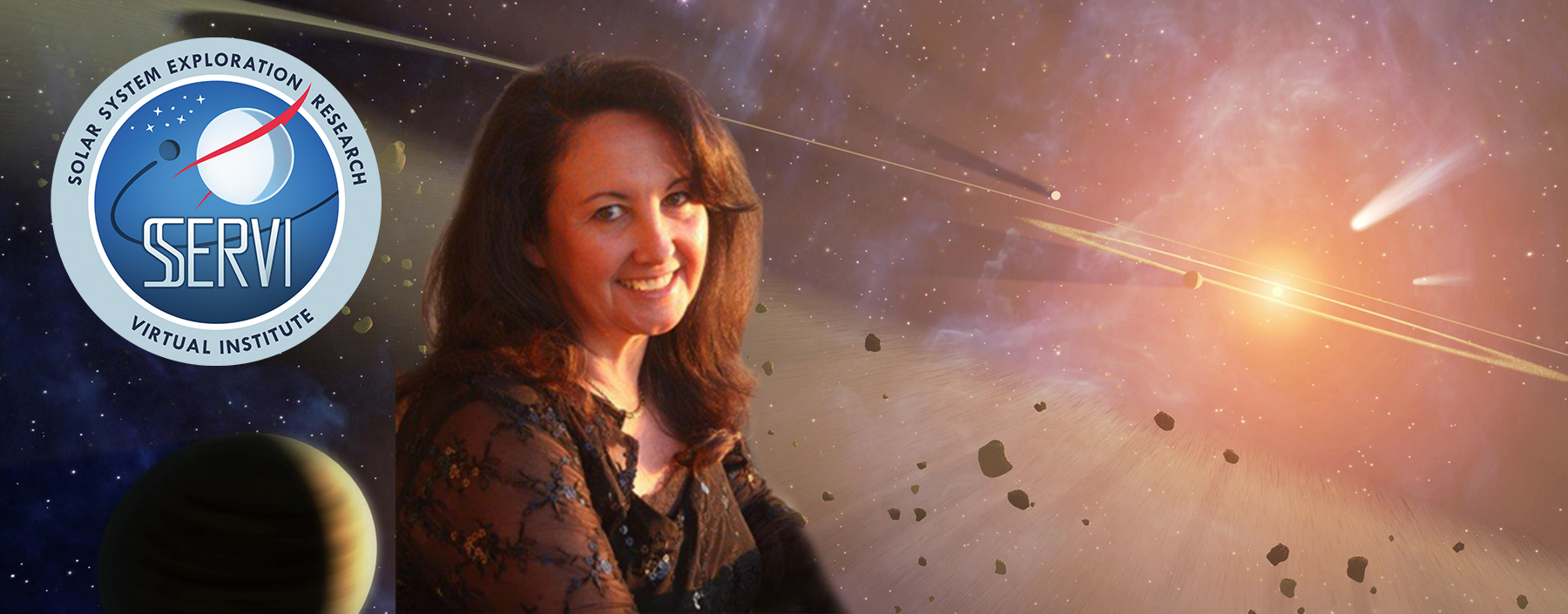
Yvonne Pendleton
Director - Solar System Exploration Research Virtual Institute
Key West, Fla.
Watching the Apollo rockets soar overhead on clear days from my back yard in Key West, I knew I wanted to grow up to "work for NASA and study the stars."
I was recruited by NASA officials from Georgia Tech during my senior year of college, and NASA-Ames Research Center (ARC) offered to send me to Stanford University for my master's degree if I could get in. I applied, got accepted and called NASA right away! True to their word, they supported me by hiring me as a full-time civil servant even though I only worked half-time, and they paid my tuition at Stanford for the next two years. After completing my master's degree in aeronautics and astronautics I decided to change fields and become an astrophysicist, because my work at NASA Ames had been in that area the entire time I was at Stanford. Once again, NASA enabled me to complete an advanced degree by supporting me as I went to the University of California at Santa Cruz for my Ph.D. in Astronomy and Astrophysics. I worked at Ames throughout my Ph.D. program, and some of my thesis data came from flights I had on the Kuiper Airborne Observatory out of Moffett Field.
My sister is ten years older than I am and has her Ph.D. in statistics. She believed in me and she inspired me by example, while fostering in me the belief that I had what I needed to make my dreams come true. My thesis is actually dedicated to her. As a role model, I learned from her to stay in school and just keep learning -- none of it will go to waste. The combination of my background in aeronautics and astronomy -- two fields I would not have thought had a lot in common -- came together for me aboard the Kuiper Airborne Observatory (KAO). (Now retired, the KAO was a C-141 cargo plane with a ~1 m telescope). I plan to submit observing proposals to the Stratospheric Observatory for Infrared Astronomy (SOFIA) as well, which is the next generation airborne astronomy platform-- a Boeing 747 with a ~3 m telescope).
As the director of the NASA Lunar Science Institute, I oversee about 200 researchers across the U.S. and manage a 13 million dollar budget per year. Currently, our seven domestic teams are joined by seven international partners, and we are all pursuing the latest discoveries in lunar science. The seven domestic teams competed to become a part of the institute, and new teams compete to be a part of the institute every four or five years. Ours is a virtual institute, which means that the small staff located at NASA Ames Research Center uses technology to communicate with and join together the U.S. teams, the international partners and students interested in lunar science around the world. In addition to our "virtual" meetings, we hold a three day Lunar Science Forum each summer at NASA Ames Research Center. Over 600 people attended in 2011.
The first one that comes to mind is the moment I realized that the data I had been working on in my office down the hall matched the data I was seeing presented during a weekly lunchtime seminar. The very distant interstellar dust that I had been studying showed remarkable similarities to the organic component of a meteorite found in Australia. I suddenly knew that the similarity could have far reaching implications because these were signatures of organic matter that came from two very different parts of the cosmos. That was an "Aha" moment for me, and my curiosity of how life started on this planet was lifted to new heights. My love of meteorites was born on that day, and I have studied these bits of extraterrestrial material ever since. I am fascinated by the idea that some of the basic building blocks of life on Earth may have come from asteroids and comets. If it happened here, it probably happened elsewhere.
If you truly love NASA as I do, you will be compelled to do whatever it takes to get here. This agency will always need people who put the goals of exploring space above their own desire for personal recognition. When people align their talents with their heart's desires, there is no limit to what they can accomplish.
I enjoy my family tremendously. I am happily married to another astronomer, and we have combined our families to join together five (now grown) children who support each other and are true friends. I also raise Golden Retriever puppies, scuba dive in warm oceans whenever I can, and seem to be writing a never-ending mystery novel.
Work hard, study hard and stay true to your dreams. Build an extraordinary life for yourself, but build one that stands on a firm foundation of education. There is nothing "fluffy" about a Ph.D. in a tough subject. If you have mastered that, you will always know you have what it takes to succeed, no matter what you decide to pursue. Do not look for a job. Design a career that will feed your soul!
Planetary science is a global profession.

